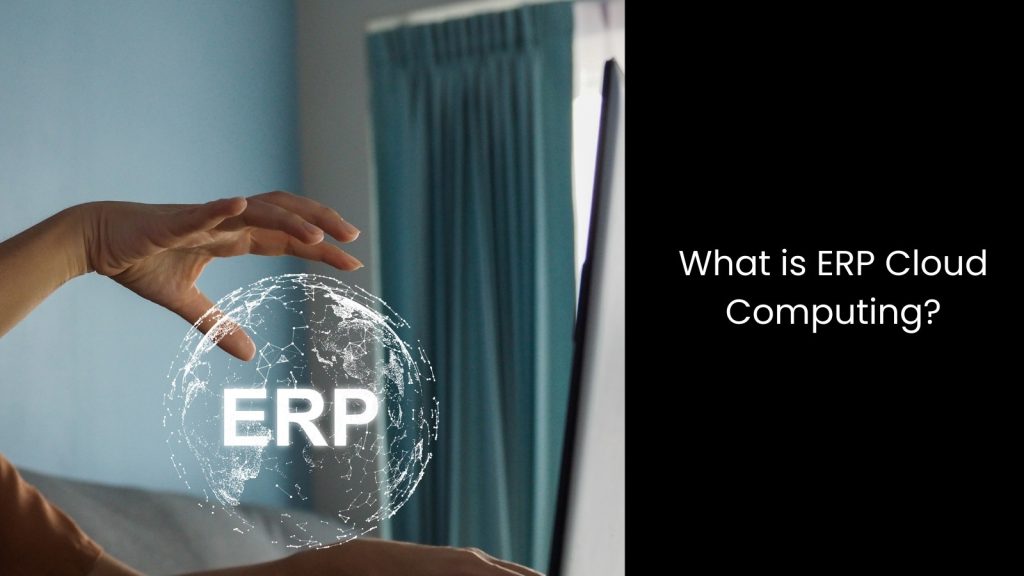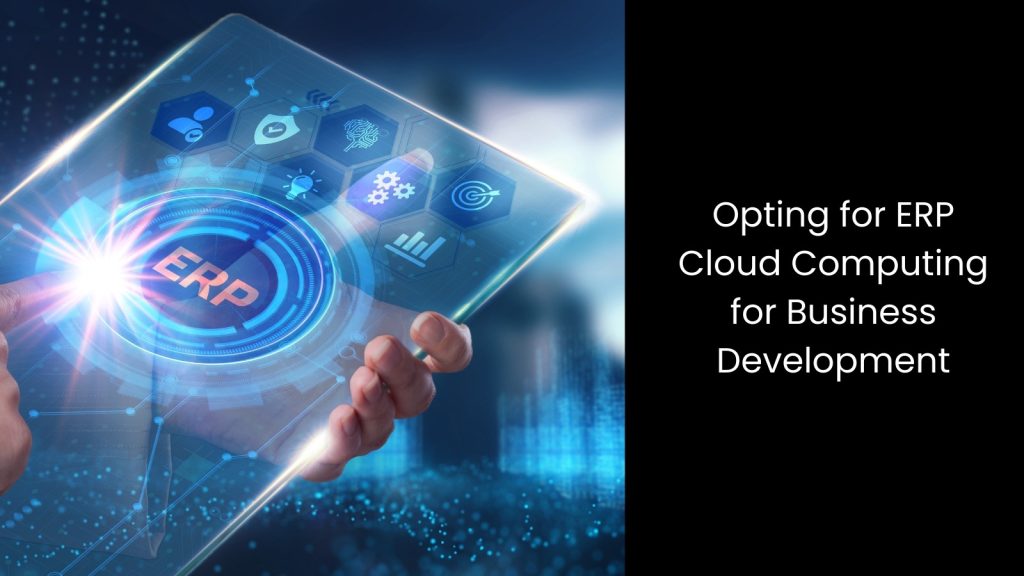It has become a trending movement in Singapore that many companies are increasingly turning to ERP cloud computing to stay ahead. It is not a wonder considering that this technology offers a transformative approach to managing and integrating various business processes, from finance and supply chain to customer relations. As businesses try hard to enhance operational efficiency, reduce costs, and improve scalability, ERP cloud computing emerges as a trendy solution.
This article explores why ERP cloud computing is not just a technological trend but a strategic necessity for Singaporean businesses aiming to rise above the mud in this digital age.
We will understand
What is ERP Cloud Computing?

First, let us untangle these two terms: ‘ERP’ and ‘Cloud Computing’.
- Enterprise Resource Planning, or ERP, is a type of software that helps businesses manage and integrate their core processes, such as finance, human resources, supply chain, and customer relations, into a unified system. ERP systems literally have the ability to streamline operations by consolidating data and automating tasks, which boosts efficiency and accuracy.
- Cloud computing, on the other hand, refers to accessing and using computing resources, like servers and software, over the internet instead of relying on local servers and hardware. Understanding these elements and their strengths, the software world has come up with an outstanding concept called ‘ERP Cloud Computing’.
- With this, businesses can use ERP software hosted on remote servers managed by a cloud service provider rather than installing and running the software on their own physical servers. As you can see, this totally contrasts with on-premise ERP computing. When it comes to on-premises, businesses have to install the ERP software on their own hardware within their facilities. The key difference between these two services lies in how the software is delivered and managed.
The Top Benefits of ERP Cloud Computing for Businesses in Singapore

Reducing Costs
ERP Cloud Computing services eliminate the need for large initial investments in hardware and software. Instead of purchasing expensive servers and software licences upfront, companies can use a subscription-based model offered by cloud ERP providers. This model allows businesses to pay a regular fee, which covers the use of the software, updates, and ongoing support.
Since they can shift to this subscription model, businesses get the ability to avoid the high initial capital expenses and can better manage their IT budgets with more predictable monthly or annual costs. The cloud provider also manages data security and backup, reducing the costs associated with protecting and recovering data.
Furthermore, cloud ERP systems are scalable. It allows businesses to adjust their subscription level based on their needs without incurring extra costs for unused resources. This flexibility helps businesses avoid overpaying for unnecessary capacity. Cloud ERP also enables companies to benefit from advanced features and technologies without having to invest in costly upgrades themselves.
If they use ERP cloud computing, businesses in Singapore can cut down on substantial upfront investments, lower ongoing IT maintenance costs, and take advantage of predictable expenses, all while accessing a robust and flexible system that supports their growth and operational efficiency.
Automatic Updates
Are you stuck in the middle of non-stop system updates?
This is one of the main benefits of cloud ERP, as its providers handle all software updates and patches automatically. This means that companies do not have to worry about manually installing new versions or fixing issues themselves.
When using cloud ERP, the service provider ensures the software remains current by regularly applying updates that include new features and security improvements. This automatic process ensures that businesses always have access to the latest tools and protections without any extra effort on their part. As it removes the need for manual updates, companies can avoid potential disruptions that come with installing updates, which might otherwise cause downtime or operational issues.
In a way, automatic updates help businesses maintain compliance with industry regulations and security standards, as they receive the latest security patches as soon as they are available. This approach to software management proves to minimise the risk of vulnerabilities that could be exploited by cyber threats. As a result, businesses can focus on their core activities rather than spending time and resources managing software maintenance. The convenience of having the cloud provider manage these updates also reduces the workload on IT staff, allowing them to concentrate on more strategic tasks.
Enhanced Security
Walking a few steps ahead of traditional on-premise computing capacities, ERP cloud computing can enhance their security significantly. It is not a secret that reputable cloud ERP providers invest heavily in advanced security measures that many businesses might struggle to implement on their own. These providers use data encryption to protect sensitive information, making it unreadable to unauthorised users and reducing the risk of data breaches.
They also implement secure access controls to ensure that only authorised individuals can access certain parts of the system. The latter minimises the chances of insider threats or unauthorised access. There are many regular security audits conducted by these providers, and those audits will help identify and address potential vulnerabilities, ensuring that the system remains secure against emerging threats. This level of security can be more robust than what many businesses can afford or manage independently.
By implementing these comprehensive security measures, businesses can protect their valuable data, comply with industry regulations, maintain customer trust, etc. The cloud provider’s investment in security infrastructure and expertise ensures that businesses benefit from up-to-date defences against cyber threats, reducing the likelihood of costly security breaches and data losses. This enhanced security capability helps businesses operate with confidence as they know their data and operations are safe with cutting-edge technologies and practices.
Disaster Recovery
Usually, in the technological world, cloud ERP providers offer comprehensive solutions to protect data and ensure quick restoration in case of data loss or system failure.
Cloud ERP systems regularly backup business data to secure servers, which means that in the event of a disaster like a hardware failure, cyberattack, or natural disaster, businesses can recover their data swiftly. These providers use advanced backup technologies to store copies of data in multiple locations, which enhances protection and reduces the risk of losing important information.
You might notice that this approach is heavily different from on-premise systems, where businesses might struggle with data recovery if their own backup processes fail or if their physical servers are damaged. Cloud ERP solutions usually include features like automatic backups and failover systems that activate if the primary system encounters a problem. This strength allows businesses to continue operations with minimal disruption.
The cloud provider’s dedicated disaster recovery infrastructure is one step forward to ensure that data recovery processes are efficient and reliable. This level of disaster recovery support can be more advanced than what many companies could afford to set up on their own.
Analytics and Reporting
You know that cloud ERP systems come with sophisticated tools that provide valuable insights into their operations. These tools allow businesses to analyse data from various departments, such as sales, finance, and inventory, in real-time. What is the point of including them?
With these insights, companies can make informed decisions and improve their performance by identifying trends, monitoring key metrics, and assessing operational efficiency. This is not part of on-premise computing. It is challenging to access and use advanced analytics and reporting tools if you rely on on-premise ERP.
The main difference is that on-premise systems usually require additional investments in hardware and software to support complex analytics, which can be costly and time-consuming. Moreover, integrating data from different departments and systems in on-premise setups can be difficult, leading to fragmented information and less effective analysis.
However, cloud systems offer integrated solutions that unify data from all areas of a business, making it easier to generate comprehensive reports and perform in-depth analyses. Cloud providers also continually update their analytics tools to incorporate the latest technologies and best practices, which helps businesses stay competitive.
Reducing the IT Burden
As discussed in the above sections, with cloud ERP, companies can shift many IT responsibilities to the cloud provider.
This means that the cloud provider takes care of system maintenance, updates, and troubleshooting, which lightens the load on in-house IT teams. Instead of spending time managing and fixing hardware, installing software updates, or resolving technical issues, the internal IT staff can focus on more strategic and value-adding activities.
This shift allows the IT department to concentrate on improving business processes, developing new technology solutions, or supporting company growth initiatives. In a traditional ERP setup, they must manage physical servers, perform regular updates, and address any technical problems that arise. This can divert attention from important projects and lead to increased operational costs.
However, when it comes to cloud ERP, businesses can simplify their IT operations, reduce the need for specialised IT skills in-house, and lower the total cost of ownership. This is certainly a huge benefit on every level.
Opting for ERP Cloud Computing for Business Development

As it has proven, embracing ERP cloud computing stands out as the best choice for businesses seeking to optimise their development strategies. You have to admit that the cloud’s robust features provide a solid foundation for innovation and efficiency. If you feel like moving to ERP Cloud Computing Software, make sure you hold hands with the best solution provider.

